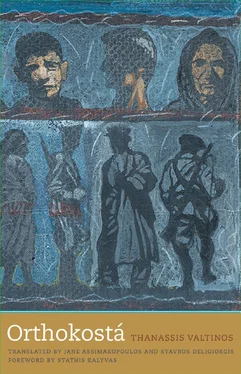
The book raised a furor when it first appeared in 1994 for presumably favoring one side of the conflict it portrayed over the other. Is it possible that so many of its critics read past the material in any single account (or the ironies inherent in the succession of any two) in an attempt to mine their subject matter for evidence of the author’s — Mr. Thanassis Valtinos of Main Street’s — own predilections? Was the medium of the many narratives so transparent and apparently without texture that they took it for raw, uninflected content? The numerous speaking sections of Orthokostá were easily construed as the evidentiary grail so many cultural historians are typically in search of. Even the possibility that the Rashomon effect might hint at the problematical nature of the novel, a text in the process of serial riddling, took second place to the quest for the oral histories covering the specific three terrible years that preceded the outbreak of the equally terrible Civil War in 1947. The knee-jerk reception of these critics to Orthokostá , personal penchants aside, might be explained in part by one legal technicality. Greece was probably the last anti-Axis country in Europe to pass legislation acknowledging that there had been resistance against the World War II Occupation powers. When the belated law was passed in 1984, both conservatives and leftists vehemently denied the other any right to claim participation in the Resistance. All this a full forty years after the withdrawal of the last German troops from Greece and only ten years before the appearance of Orthokostá , with its provocative polyphony.
There have indeed been the exceptional readers who sensed an “impersonal” air to the book. They recognized Valtinos’s attraction to the slice-of-life, unsentimental folk forms that had informed a large number of his earlier works and to the unself-conscious, unschooled speech patterns of the man in the village coffeehouse, whether in Lesbos ( You Will Find My Bones Under Rain , 1992) or in the Kastri epicenter of Orthokostá . Valtinos’s often nameless speakers parallel his own rather oblique presence in the larger story. Starting out as the primary listener to and transcriber of the numerous reminiscences, he comes across at first as the anthropologist’s participant observer and only gradually as the native interrogator’s amanuensis. The writer’s intermittent visibility in many of the narratives is but the self-ghosting of “Valtinos” the virtual editor who leaves no trace of his hand behind, no hint that he determined the order or form in which the book would greet or confront its readers. As the protagonists’ sex and political persuasions become progressively clearer, however, the novel appears to be concerned less with the characters’ existential predicaments, and lesser still with Greece’s role in the geo-ideological theater of the Balkans in the 1940s. Far from conflating the conventional in art with the historical, Orthokostá does not miss a chance to foreground the musicality of its linguistic medium and the logic of its structure. In doing so it appeals on almost every page to the range of its readers’ relationships to the craft of literature in general and the concision of poetry in particular.
Gradations of timbre abound. Some sections read like officers’ reports to headquarters, others like legal treatises. They are the sections that make use of the purist, katharevousa, idiom by the speakers, who range from schoolteachers to lawyers to Party cadres. Other sections feature the reluctant responses to questions by an unidentified interlocutor. The philosopher Walter Benjamin, in his essay on Nikolai Leskov, observed that survivors of the carnage of World War I, contrary to expectations, were less not more talkative. The chronicler in Orthokostá , several times, gives way to the rhapsode, like the unidentified narrator (Homer?) in the Odyssey who, at some point, asks his fictional hero, “What did you do next, Odysseus?” The mix of the individual and the supra-individual in the novel suggests that its core of insight and sympathy lies not in the individual stories but rather in their seemingly unedited transcription as oral accounts that somehow reached the domain of the page in the form of an affidavit. Convention and invention are so tightly intertwined in the structure of the book readers may forget to shift from the substance of each first-person point of view to the page’s unacknowledged origin. The Aristotelian unities of action, place, and time have been replaced in the novel by a roaming ear that captures inflections and idiosyncratic expressions about incidents beyond count that each chapter introduces with dreadful timing.
The periodic cross-fading of personalities in their relationship to time and the landscape of the Peloponnese underscores Valtinos’s implied insistence that he is dealing in uncoached random reports. Somehow, magically, Valtinos’s wildly variegated statements exhibit an interconnectedness and relevance to one another reminiscent of wind-blown papiers trouvés . Cervantes’ hero Don Quixote at some point in the novel that bears his name expresses an irrepressible desire to read every torn piece of paper littering the streets of the city. In practical terms, Valtinos has often acknowledged the same urge. His novel Data from the Decade of the Sixties (1989) exhibited a gargantuan appetite for the discarded and found scraps Cervantes writes about. Newspaper clippings, illiterate application forms scavenged from office wastebaskets, and letters of the lovelorn to a Greek Miss Lonelyhearts make up the Data “novel.” The transitionless linking together of so many sections of Orthokostá leaves no doubt that this novel is erected on a more elevated plane and in more closely figured themes than the docu-fantasies of his other books. The apparently unmediated orality in Orthokostá exhibits the stark ethopoeia of Aeschylus’s Persians and Thucydides’ unapologetic speeches in the genocidal Melian expedition. Both, like Orthokostá , make for fractured readings in times of fractured collectivity.

Once past the prefatory utopia Valtinos sets the tone for the kind of communication that has neither Bishop Isaakios’s euphuism nor the detachment of its modernist retraction in the finale. The page-long first chapter contains a woman’s recollection of the summer wind carrying cinders from houses burning in neighboring villages. She cites the urgency of men’s messages to their families to pick up everything and make themselves scarce because bad things are coming their way. The sense of approaching danger, the rumors of violence spreading facelessly like a contagion, is so gripping that one forgets that this is happening in Arcadia, where such things are not supposed to happen. The unthinkable is becoming real. A local can tell that the smoke is not coming from burning vegetation. Houses that had not been bombed by Germans or blown up by Italians are now being torched, one after the other, with the help of a broomstick set afire by a fellow Greek’s flint lighter. This man, mentioned by name, even exchanges a quip or two with the members of the committee that was carrying out orders as directed by the Party chapter chairwoman.
Like Hawthorne’s “Custom-House” overture to The Scarlet Letter , Valtinos’s audible hovering in portions of Orthokostá ensures, primarily, that its realist frontage does not falter, that its linguistic cast will give pleasure, and that its apport to the imagination will be to so conceal art that it will come across as artless. And what better masking of the conventions of the techne in any art than the apparent artlessness in direct voice transcriptions? Valtinos’s lifelong contributions to Greek cinema, including widely known collaborations with Theodoros Angelopoulos, may go a long way toward explaining his method: no genre does a better job of obscuring the seams of editing, the splicing and shuffling of “takes,” than the documentary. The framing mode of the audio-to-paper transfer is made explicit in other books by Valtinos. A cassette recorder is mentioned in Deep Blue Almost Black (1985), and The Life and Times of Andreas Kordopatis (1964) is an oral account partially based on an emigrant’s journal. Regarding Orthokostá , it matters little whether the published material is lifted from “live” recordings or simply “hearsay.” Even if Valtinos had done “the police in different voices” (T. S. Eliot’s original title for The Waste Land ) in the forty-nine chapters of Orthokostá , this in itself would be no mean feat. Neither Bishop Isaakios’s “blurb” on the land around Orthokostá nor the Triple A — like epilogue would lie beyond Valtinos’s inventive abilities. In the end both are fictions that serve, each in its own way, to distance the reader from the gore and suffering associated with Orthokostá.
Читать дальше



